Dakota Pipeline: What's behind the standoff?

What is behind the months of confrontation between police and protesters?
What is the Dakota Access pipeline?
The $3.7bn (£2.8bn) pipeline is projected to be nearly 1,200 miles (1,930km) long and will transport some 470,000 barrels of crude oil a day from North Dakota to a terminal in Illinois where it can be shipped to refineries.
The pipeline will provide a more cost-effective, efficient means of transporting crude, rather than shipping barrels by train. The project, built by a subsidiary of Texas-based company Energy Transport Partners, will also increase profit margins for oil companies while crude prices are low.
What is the controversy about?
The Sioux Native American people of Standing Rock argue the pipeline has unearthed and will go on to disturb various ancestral sites, including stone circles and sacred ground, if it is built. The sites are technically just north of the tribe's reservation but the Sioux say the government took this land from them illegally in a series of treaties in the 1850s-1860s.
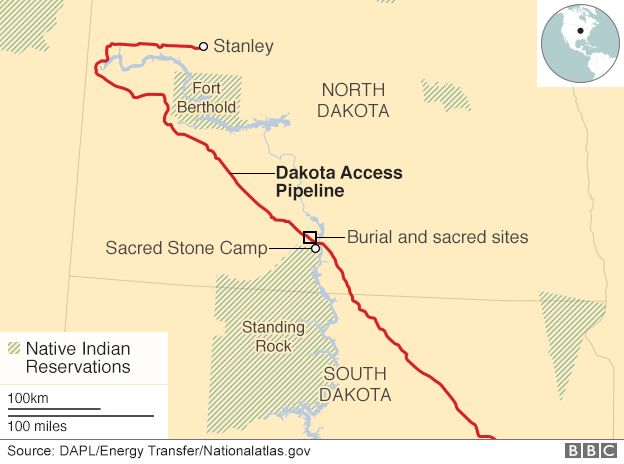
The tribe also say the pipeline could leak and contaminate their drinking water. It is projected to run under the Missouri river, just north of their reservation. The Sioux started protesting in April, setting up Sacred Stone spiritual camp near the river.
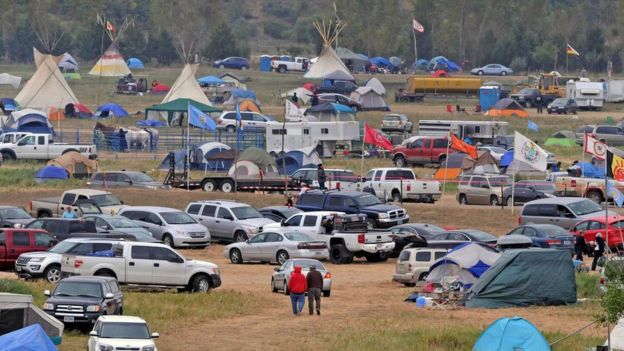
The Sacred Stones camp
Native Americans have also accused the government of approving pipeline construction without consulting them, a requirement under US law.
Environmental activists have joined in protests with the tribe, saying the pipeline will perpetuate fossil fuel production.
Who are the protesters?
The protesters include environmental activists, citizens supporting the cause, the Sioux and other native tribes who have joined to show solidarity with the Sioux.
More than 200 Native American tribes have pledged their support to the movement. It is the largest coming together of indigenous peoples in the US in decades, perhaps centuries.
Several actors including Shailene Woodley and Mark Ruffalo, and Green Party presidential candidate Jill Stein, have also rallied alongside protesters.
Have the demonstrations been peaceful?
While the Native Americans have said they are committed to peaceful unarmed protests, demonstrations have turned violent.
Last week, a Colorado woman fired three shots in the direction of police as officers sought to forcibly remove protesters camped on private property. The woman was arrested and has been charged with attempted murder.
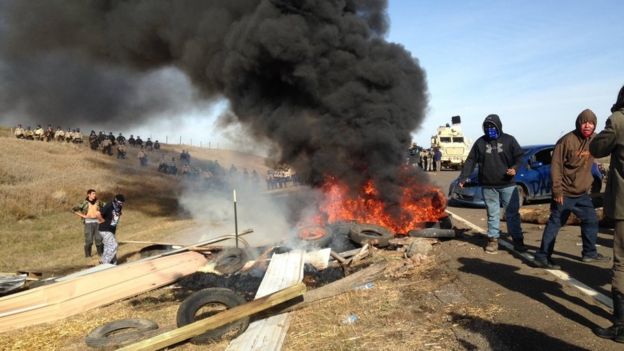
Protesters have tried to block roads
Other reports say protesters have started fires and thrown debris at officers, including petrol bombs.
Protesters are divided in their response to the authorities. Some militant activists have called for aggressive tactics while others insist demonstrations must not break the law.
How have authorities responded?
Police have been criticised for using excessive force, including spraying crowds with pepper spray and firing sound cannons, bean bag rounds and rubber bullets.
Jacqueline Keeler from the Sioux tribe told the BBC: "They used a sonic device and then also they used rubber bullets and we have shots of people who had rubber bullets right to the face.
"They Mace'd elders right in the face. They dragged people out of sweat lodges [steam baths]. They shot one 15-year-old boy's horse and killed it under him."
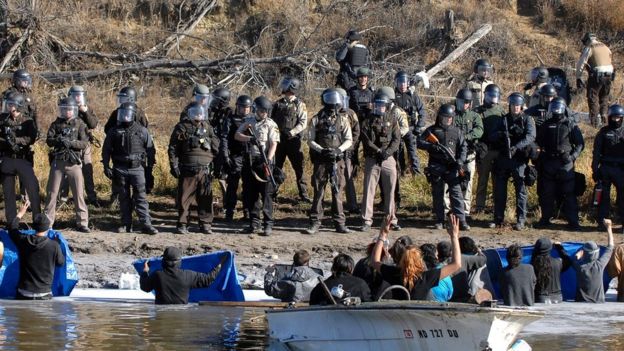
Officers have hit many protesters with pepper spray
Officers have arrested hundreds of people and accused activists and journalists of criminal trespass, rioting and other felonies.
During mass arrests last week, police held protesters in temporary cages made of chain-link, which activists equated to "dog kennels".
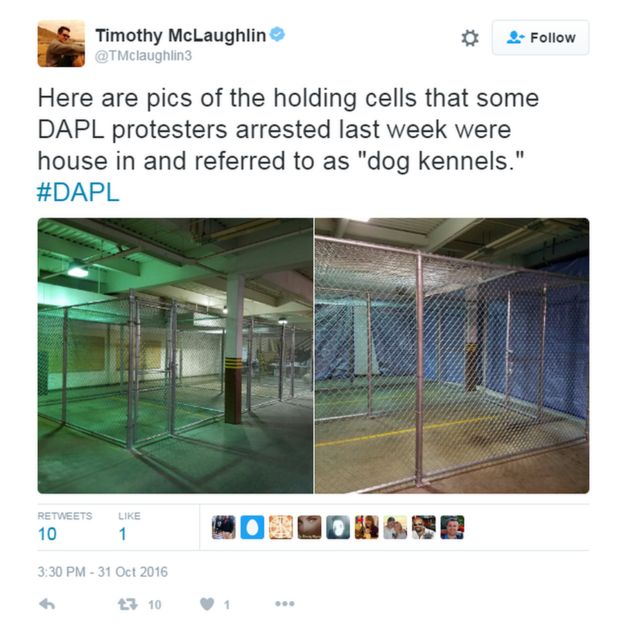
In September, a private security firm hired by the pipeline set attack dogs on protesters. The dog handlers could face criminal charges after a local investigation found the firm was unlicensed.
Who would the pipeline benefit?
The pipeline would benefit oil companies, shareholders and local governments. Dakota Access says the project will create between 8,000-12,000 jobs and will generate $55m in annual property taxes.
The project could also be advantageous to Republican presidential candidate Donald Trump. He owns shares in Energy Transfer Partners and the company's chief executive officer donated to his campaign.
Farmers could also benefit. North Dakota's crude oil is currently shipped out by train which has caused congestion and rail delays, slowing the shipment of grain and increasing grain prices.
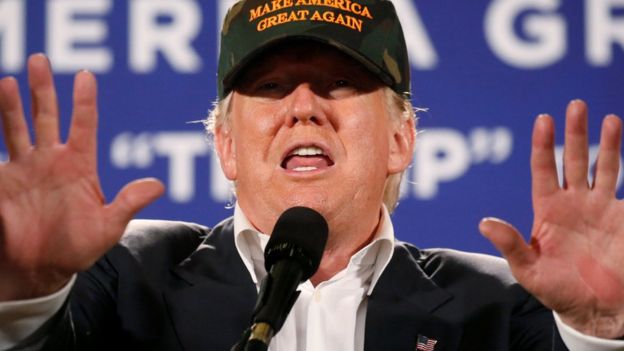
Republican presidential nominee Donald Trump
What are the legal issues?
The Sioux have filed a suit against the Army Corps of Engineers, the agency that typically approves inter-state pipelines, for permitting Dakota Access construction without proper consultation.
According to US law, federal agencies are required "to consult with Indian tribes when they attach religious and cultural significance to a historic property regardless of the location of that property".
Native American tribes by law govern themselves. Tribes also enjoy a "government-to-government" relationship with federal authorities, protected by the US Constitution. The Sioux say these provisions were ignored in the pipeline construction.
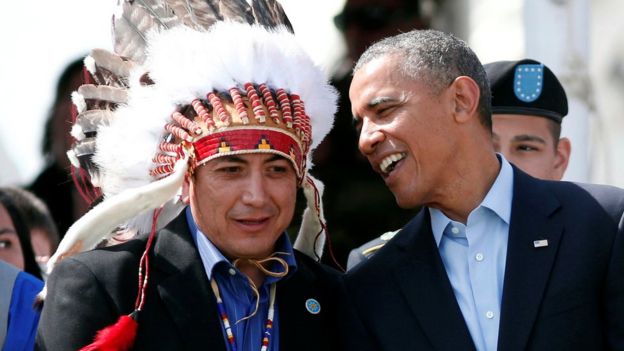
Standing Rock Sioux Tribe Chairman David Archambault II with President Obama
In September the federal government temporarily blocked pipeline construction under the Missouri, close to the Standing Rock Reservation. Although this ruling is binding until further notice, construction elsewhere along the pipeline's route is not prohibited and has continued.
But on Wednesday, in an interview with US news site NowThis, President Barack Obama said there were "ways to reroute this pipeline".
"My view is that there is a way for us to accommodate sacred lands of Native Americans. This can be resolved in a way that I think is properly attentive to the traditions of First Americans.
"I think right now the Army Corps is examining whether there are ways to reroute this pipeline in a way."
Following Mr Obama's statement, Energy Transfer Partners spokeswoman Vicki Granado said in a statement: "We are not aware that any consideration is being given to a reroute, and we remain confident we will receive our easement in a timely fashion."